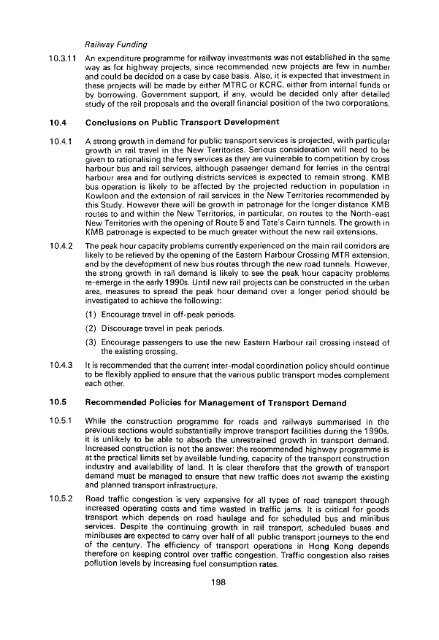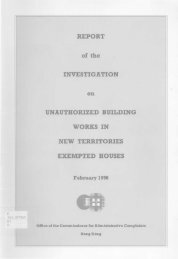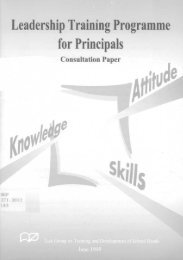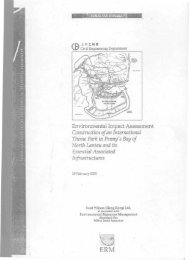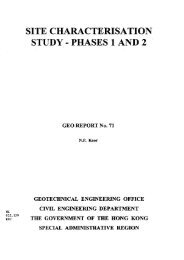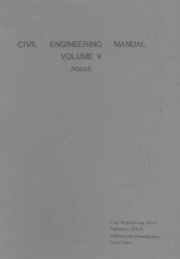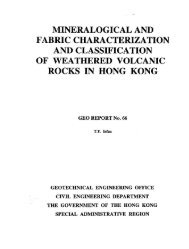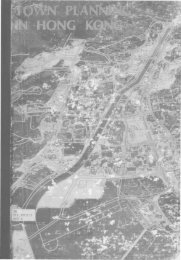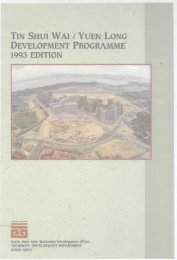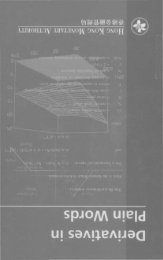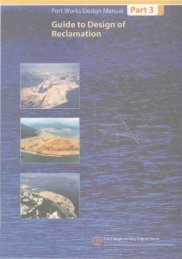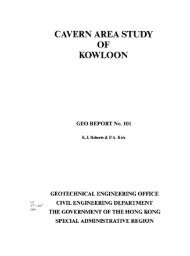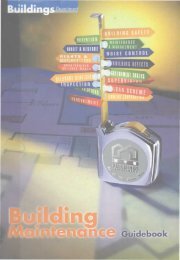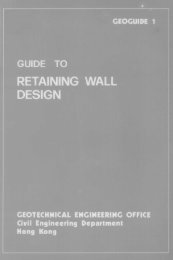Untitled - HKU Libraries - The University of Hong Kong
Untitled - HKU Libraries - The University of Hong Kong
Untitled - HKU Libraries - The University of Hong Kong
- No tags were found...
Create successful ePaper yourself
Turn your PDF publications into a flip-book with our unique Google optimized e-Paper software.
Railway Funding10.3.11 An expenditure programme for railway investments was not established in the sameway as for highway projects, since recommended new projects are few in numberand could be decided on a case by case basis. Also, it is expected that investment inthese projects will be made by either IVITRC or KCRC, either from internal funds orby borrowing. Government support, if any, would be decided only after detailedstudy <strong>of</strong> the rail proposals and the overall financial position <strong>of</strong> the two corporations.10.4 Conclusions on Public Transport10,4.1 A strong growth in demand for public transport services is projected, with particulargrowth in rail travel in the New Territories. Serious consideration will need to begiven to rationalising the ferry services as they are vulnerable to competition by crossharbour bus and rail services, although passenger demand for ferries in the centralharbour area and for outlying districts services is expected to remain strong. KMBbus operation is likely to be affected by the projected reduction in population inKowloon and the extension <strong>of</strong> rai! services in the New Territories recommended bythis Study. However there will be growth in patronage for the longer distance KMBroutes to and within the .New Territories, in particular, on routes to the North-eastNew Territories with the opening <strong>of</strong> Route 5 and Tate's Cairn tunnels. <strong>The</strong> growth inKMB patronage is expected to be much greater without the new rail extensions.10.4.2 <strong>The</strong> peak hour capacity problems currently experienced on the main rail corridors arelikely to be relieved by the opening <strong>of</strong> the Eastern Harbour Crossing MTR extension,and by the development <strong>of</strong> new bus routes through the new road tunnels. However,the strong growth in rail demand is iikely to see the peak hour capacity problemsre-emerge in the early 1990s. Until new rail projects can be constructed in the urbanarea, measures to spread the peak hour demand over a longer period should beinvestigated to achieve the following:(1) Encourage travel in <strong>of</strong>f-peak periods.(2) Discourage travel in peak periods.(3) Encourage passengers to use the new Eastern Harbour rail crossing instead <strong>of</strong>the existing crossing.10.4.3 It is recommended that the current inter-modal coordination policy should continueto be flexibly applied to ensure that the various public transport modes complementeach other.10.5 Recommended Policies for Management <strong>of</strong> Transport Demand10.5.1 While the construction programme for roads and railways summarised in theprevious sections would substantially improve transport facilities during the 1990s,it is unlikely to be able to absorb the unrestrained growth in transport demand,increased construction is not the answer; the recommended highway programme isat the practical limits set by available funding, capacity <strong>of</strong> the transport constructionindustry and availability <strong>of</strong> land. It is clear therefore that the growth <strong>of</strong> transportdemand must be managed to ensure that new traffic does not swamp the existingand planned transport infrastructure.10.5.2 Road traffic congestion is very expensive for all types <strong>of</strong> road transport throughincreased operating costs and time wasted in traffic jams. It is critical for goodstransport which depends on road haulage and for scheduled bus and minibusservices. Despite the continuing growth in rai! transport, scheduled buses andminibuses are expected to carry over half <strong>of</strong> all public transport journeys to the end<strong>of</strong> the century. <strong>The</strong> efficiency <strong>of</strong> transport operations in <strong>Hong</strong> <strong>Kong</strong> dependstherefore on keeping control over traffic congestion. Traffic congestion also raisespollution levels by increasing fuel consumption rates.198


